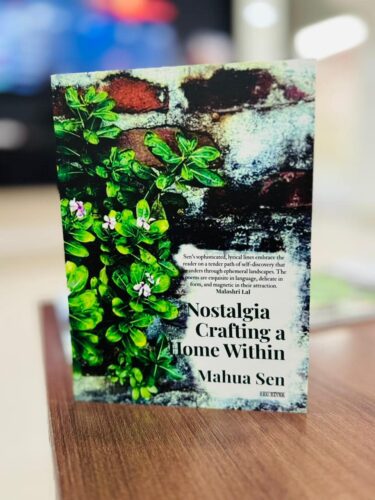The longing for a memory which is stitched to a home or a geographical location is the way a person understands nostalgia. This kind of nostalgia gets married to everything we do, if we are living far away from what is our truest kind of home. Mahua Sen’s collection of poems, ‘Nostalgia Crafting a Home Within’, speaks about the yearning of the poet. Absurdity is not something which is meant for ridiculous stuffs. In case of art, the sense of clothing the core emotions are a way to enter certain minds. They understand the importance of scratching the bits and pieces of memory.
Poems on identity attached with a place should do justice to the thoughts of those who have been abandoned or live in places different from the rest. Mahua’s poems circle the locations many might have or have not visited, but surely, they want to be a part of the lyrical journey. The poems have their own world which may fall hard for those who are not into poetry. These poems ask for our time and should be read with patience. To peel the layers of Mahua’s thoughts, one has to sweat as a reader. Undressing them though is a better idea to understand the sensitive fabrics of nostalgia.
The prowess of a personal space to linger in your mind is where performance meets personality. We get shaped by what we think about people and places around us. The essence of the poet’s mind lies in making a place’s presence felt in our lives. To illuminate the presence, she speaks about the association of images which justifies its past, present and future. A reader is not supposed to go through all the streets to reach a location. Yet if one does, it is going to be a tiring task. The art of Salvador Dali rightfully speaks about the need of a singular entity to strengthen a particular person or place. Mahua although tries to break it. It is a tough nut to crack, but she hits the better crack-points of the nut. As a reader, one has to look for those spots to get a better pixelated image.
The poet has a way to tickle relationships or even its rudimentary memory. The path to meet her childhood comes from a personal space. But the poem turns into the idea of an adult. From the inception of literature, many poets have chosen to portray childhood from the lens of a mature human being. There can be two major reasons behind its origin: the first one lies in the notion that in a society poetry is read by the adult section, and to a very significant extent, it is true; the other reason stems from the operation of the mind. The mind of an adult seeks solace in how it used to be when the individual was five-years old. Yet, in one or the other way, it takes the shape of how an adult thinks about the past. Mahua ties the knot between both the ages. It can blur the vision of some readers. But with time, the gap is going to reduce if the effort is to magnify the childhood.
So, in her prose piece, ‘Grandfather’, when Mahua remembers her grandpa, the lens is of an adult poet who has lived the memory. But when she begins to spill her memory, the reader gets to know who she used to be. This, according to me, is the picture one wants to see or read. Not something what the writer wants to write. We can all relate to the write-up. It is just that we get to live it less. It is a cultural conditioning, but it works for a particular sect only.
The poet writes:
“I recall the evenings when the fragrance of wood smoke wafted through the air. Kerosene lamps were placed in every room, except for my grandfather’s chamber. Instead, he would light a single candle each evening.
To this day, I cannot decipher whether he favoured the elliptical flame, loathed the scent of kerosene, or simply preferred a softer light to the brighter alternatives.”
In the poem, ‘Ephemeral Echoes’, the poet weaves a phenomenon we have lived or are living in. To slip into the void is the state where everything feels like an echo. The illusion of a sound is false, but the existence of that sound too, happens to be untrue. The poem is a long one and joins several happenings like a cascade. It begins and ends on a sharper note, and in between them, the poet leaves the rest on the readers craving. Thus, it is a reader’s poem. The portrayal of frustration and desire is fresh. The expansion of the world reaches its fertility. Yet like every piece of art, it too deserves a little space. But the poet’s torment leaves patches. One must touch them to feel the moisture, the content and its future stuck in every layer of the process of observation.
Mahua writes:
“Last summer, she dissolved into the inky depths of night.
Yet her gentle presence persists, her breath,
Her soft echoes resonate through the unfinished,
Intricate tapestry of her existence.
She remains ensconced between
the battlements of memory and reflection.”
Mahua’s poem, ‘Rainbow’, is about how precisely the fabric of many kinds of attire blends with the reality beyond them. The flow of the poem sprinkles a certain kind of joy which is delicious. It has the breath of quiet nights and the entropy of soft caressing. It is a story where love takes the secondary position, but keeps its seat reserved. Lust and the erotic measurements flies towards the readers like a maple leaf. We do not know the geography of a bed which is not ours, but we surely do love to know what are the necessities of this journey. The poem is all about doing justice to pleasure that is tied to romance. It starts from what we wear, and ends on how they are taken off, so that, one body melts over another. The metaphors of the poem solidify the poet’s vision.
She writes:
“Flaunting my white chiffon dupatta,
I would often pirouette, on the dance floor of your soul;
dying your soul red,
impregnating it with crimson passion
akin to my alta.
For the faience of the rainbow
always arched down to clutch our hands,
chaperoned by the indolent sun.”
With time, readers of poetry, get to know the pleasure of simplicity. The poet thinks like a simple woman does, and has the same perspective. Yet the poet majorly likes to keep on flowing through good and bad times. It works for those who have the intensity poetry demands. So, the editing raises a few eyebrows since many of her pieces land softly, when the impact should have been harder. It is where the editor’s job should blend in unison with the poet. A knife works better than a sword in a crowded place. India is full of poets and a rise of readers is vivid on social media. A sharp editing would have made a better appeal since the poems deserves a wholesome acceptance. From a reviewer’s perspective, the thrust of the poet’s art is hopeful and grows slowly like autumn.
Nostalgia Crafting a Home Within is a string which has beads of identity, memory and nostalgia. The fertile poems sophisticate the daily matters of human condition. From the cityscapes to the land where ideas are born, the volatile poetry feeds the imagination. The collection is going to stay in the mainstream for the intricate matters they speak about leaving us a lot of ideas to caress.
*









Thanks a lot, Kabir.
Gratitude to the curators of Saaranga.